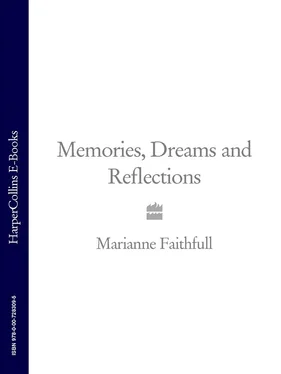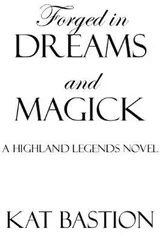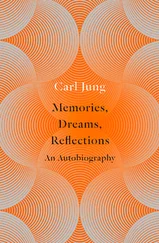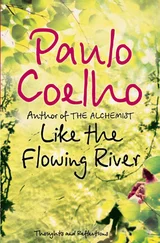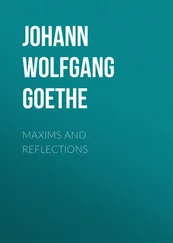Mick must have realised when ‘Sympathy for the Devil’ started that it was a mistake. Every time they’d play it on that tour, he’d say: ‘Something funny happens when we start this.’ He got off on it – as if something might happen if he said it. And then suddenly it wasn’t funny any more. It’s the same old thing: wanting to have power over people. And often they don’t think about whether it’s good power, whether it’s positive or negative – it’s part of being young and stupid. Something happened to him out there on that tour. He’d always been so sweet and gentle – he began to get harder after that. The fact that I’d gone off to Rome with the painter Mario Schifano while he was gone didn’t exactly help his mood when he returned.
All these things eroded our relationship, but there were other more fundamental problems. As much as I loved Mick, the actual life, the big rock star life, wasn’t really for me. Mick, however, couldn’t live any other way, and I wouldn’t expect him to, it’s just part of his nature.
I love Bob Dylan’s attitude to the sixties. ‘I am the sixties. You want ’em? You can have ’em!’ Oh, God, that made me laugh so much! But, you must know by now he’s a sly dog and as slippery as an eel. He’s like some sort of creature that, as soon as you identify what it is, it turns into something else – a chameleon! Bob has a clever, oblique way of talking about himself. And because he’s so mentally agile he can see-saw about the sixties as much as he likes. He knows you can never take him out of the sixties, however much he grumbles, so his ambivalence about his decade is just a prank. If you take him out of the house of cards it would collapse. He just wants to be the Joker in the pack.
Bob’s old records are so embedded in our lives everybody gets nervous when a new Dylan record comes out. There’s so much expectation. When Modern Times was released, I talked to Polly Harvey and I told her how wonderful it was and she said, ‘But, oh, I’m scared! I’m scared!’ And I said, ‘Don’t be! It’s all right! It’s more than all right!’ We always hope it’s going to be this great thing – and there have been some clunkers, haven’t there? Some real downers, too. Time Out of Mind was very negative, but, as always, there were a couple of great tracks I loved, like ‘I’m Sick of Love’. I know that feeling – you want it but you get so sick of that old roller coaster.
Bob’s been competing with himself since 1966, trying to outdistance his own mythology. I was listening the other day to his radio show. He was talking about fathers and there was this bit where Bob says, ‘Well, you know, manic depression and depression and bipolar disorder, these are really all just the blues.’ He sees everything in a mythical context. The contemporary world is ersatz, a fallen model. And then he played Lightning Hopkins. It was a wonderful moment. I thought, ‘Yeah, man, that’s exactly what these people are doing, taking away the lightning, taking away the blues.’ The blues have that wonderful irony. I’ve naturally got them, I’m never going to be able to be rid of them – I couldn’t bear it, I wouldn’t be me.
On his show, Bob does his radio voice, the smooth, soft-talking deejay. Old possum Bob. That’s what I like so much about the Dylan radio show, that he’s playing a character – I love that he’s gone to the trouble to create a new persona. Of course, he’s always been good at manufacturing personae – brilliant. I love to see that he hasn’t lost his touch. I keep thinking that I want to send him an e-mail from Marianne in Paris saying: ‘Love the radio show, love the character. Don’t change a thing!’ But what Bob really likes to hear is young people criticising him. Because he loves saying what he really thinks. They’ll say: ‘Why don’t you play more new music, Bob?’ And he says things like: ‘Well, Scott from Arlington, the thing is, there’s a lot more old music than there is new music.’ That’s an argument I wouldn’t have thought of, and so very typical of him. He basically thinks modern music is crap, but he does play it occasionally. He played a Blur track the other day called ‘Coffee & TV’, but most of what he plays is stuff you’ll only hear on some old hipster like Hal Willner’s answering machine, the wildest, oldest stuff you can imagine.
Bob still thinks of me as the angelic Marianne of the mid-sixties and whenever he sees me drinking and smoking he gets a bit cross. I’d like to say I’ve reformed – I have actually, I hope that doesn’t disappoint – but unlike Bob I haven’t found God in the process. Bob is very religious but when it gets to God and all that, I feel I have to say to him: ‘You know, Bob, I’m really not religious actually.’ I know I shouldn’t say those things, but I feel I have to. I’m not a pagan or a witch or anything dark or satanic, I’m just a humanist like my dad. But it’s all over the place. Religion, God, Christ on the cross. And if they’re not Christians, they’re Scientologists. Look at Bono, too, with his big cross and everything. I understand that people have to do what they have to do to get through, but I don’t think you have to impose your thing on other people. But I do know that when you make that kind of statement to Bono, you’re kind of left out, they cut you out of their plan. ‘Oh, well, if she’s not Christian …’ They look askance. ‘Must be something wrong there.’ That’s such nonsense. Christians have always done that. If you’re not part of them, then you’re against them, and I’m not against them, I just don’t want to be them.
My 2002 tour promoting Kissin’ Time ended in Australia, which is where Bob Dylan was just beginning his tour. We sat together on his balcony with a full moon shining over Sydney Harbour, talking about music – and ourselves – with a smattering of light flirtation. He told me he’d listened to my recent record, 20th Century Blues , and that he loved Kurt Weill’s chords, and he would eventually use them in those thirties-type songs on Modern Times . Kurt Weill took many of his melodies from music he heard in the synagogue and I’m sure Bob knew that.
I love to hear Bob talking about the blues and how we’re all linked to that music. That was very good for me to hear. And folk music. How you take that music and change it by running it through your own temperament.
Bob understands my voice because he’s got a funny voice too. I saw him backstage when I was about to start work on Vagabond Ways with Mark Howard and Daniel Lanois and he’d just worked with them. He said, ‘Don’t worry, it’s going to be fine with them. People like us with funny voices, they’ve only just now figured out how to record us, and the way is not to use digital. You have to use analogue recording equipment.’
I love the way Bob uses his voice to create a persona. On his radio show, Theme Time Radio Hour , you have Ellen Barkin saying, ‘It’s night time, a cat howls, the high heels of a prostitute clicking down the street, the moon shows for a second and disappears behind the clouds. Here’s your host, Bob Dylan.’
What amazes me about the sixties, because, in my mind, of course, it’s only yesterday, is how historic it’s become. We’ll soon be lumped with the Battle of Culloden, the Peasants’ Revolt, the Armada, and the invention of the loo. Over forty years ago! Longer! The strangeness of the whole passing pop parade – from Mod to Hippie to Glitter to Punk – will soon be part of the Ancientness of Olde England. It’s odd, too, that the sixties, with its grand image of itself, ended not with a whimper but a bang – and woe betide any who got in the way of its thrashing apocalyptic tail.
Читать дальше
